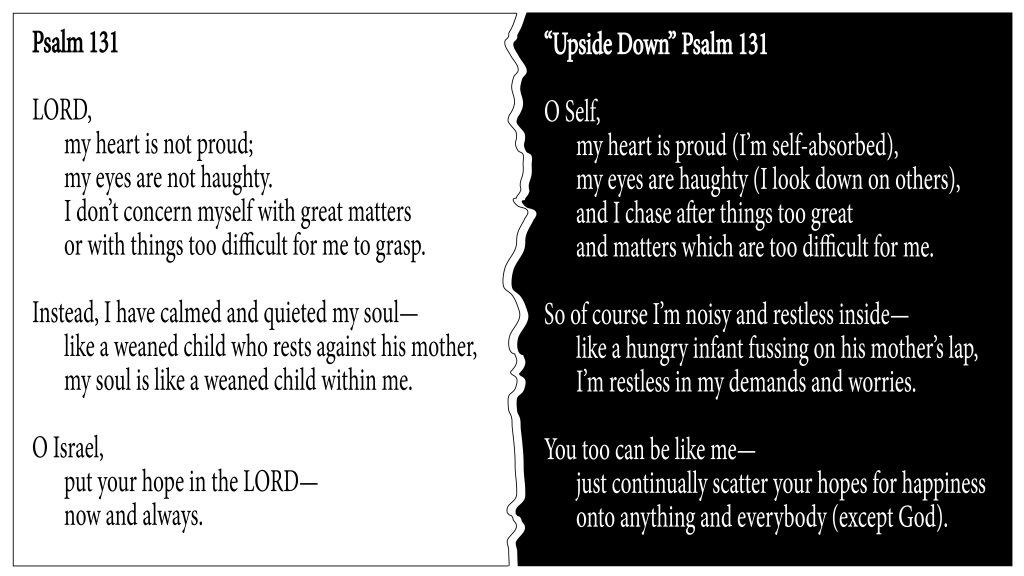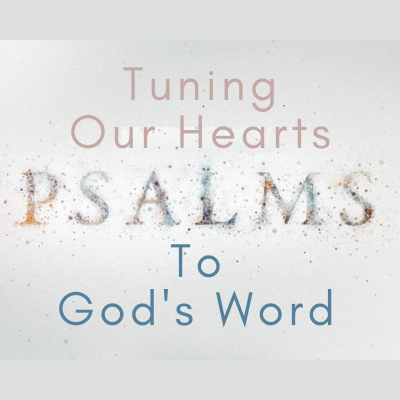SERMON SUMMARY
Each morning, it seems, we wake up to a new image of a shooting and of families and communities mourning. We see images of peaceful protests, and we see other images of buildings burning and stores being looted. The peace we say Christ brings seems to allude us. What is the “noise” going on inside you? What is the secret to gaining a quiet heart? In Psalm 131, David shows us how he became peaceful and composed inside, even when his life was messy on the outside. Psalm 131 also does not present us with a blissful, zen-like detachment. It’s not about having a laid-back personality or about retreating from life’s troubles. The quietness of Psalm 131 is not the quietness that comes from easy circumstances, from denying or ignoring difficulties. David’s quietness of heart was hard- fought for; it is inner quietness in the midst of action, relationships, and problems. Psalm 131 is about a learned composure. It is achieved, not automatic. It is conscious and chosen. It is self-mastery by the grace of God. We too can learn to compose and quiet our souls, and Psalm 131 shows us how. Sometimes the best way to understand something is to look at its exact opposite. The route to quiet composure becomes crystal clear if we turn this psalm upside down, taking the opposites of all its affirmations…

Israel was a confederation of twelve tribes who had a lot of distrust and tension between them. David had the job of leading that ugly, dysfunctional mess. The inner peace David reveals in Psalm 131:1 was not gained by rejecting life’s challenges, but by rejecting sinful pride and haughtiness or arrogance. It would have been easy for David to show favoritism toward the tribes which were closest in kinship to him, and to under-value and mistreat the other tribes. But David refused those temptations.
Pride is not just about me (“I’m right.”); it’s also about you (“I’m right compared to you.”). That’s why David said both that he’s not proud (self-absorbed) and also that his eyes were not haughty; he didn’t look down on others. Pride is a deceptive thing. It doesn’t always look puffed-up; it doesn’t always brag. Pride looks deflated when it fails, when it is intimidated, when it despairs. That’s pride too. The proud, ambitious heart produces the “noise” of anxiety and irritation. The proud heart is fretful, self-preoccupied, easily offended, depressive, competitive. The proud heart pursues impossibilities (“things too great and too difficult”). Sometimes even small things can be “beyond us”—like trying to control other’s attitudes and choices, bending them to our desires. Noise in our souls is generated by trying to control things that God has not made us responsible for. But when we pursue what we’re called to, then we have composure. When we go after the right things (2 Timothy 2:22; Philippians 2:3-8), we find them to be within our God-given ability.
We gain composure through a weaning process. Something that once meant everything to us must come to mean nothing. A newborn demands milk. He doesn’t request it; he doesn’t ask if mom is busy or tired. Dying to our restless, fretful, irritable ways does not come easily. This is not a passive process. We cannot do this by ourselves. We’re not strong enough. And, we’re too strong. Our own cravings within us are too strong for us to master alone. We need Jesus; he can calm any storm. But we must supply some things: intelligent repentance, genuine faith, and specific obedience. We must think about God’s love, wisdom and power; we must remember God’s covenant relationship with us; we must remain patient and wait on God’s timing. An unweaned child demands immediate satisfaction. The adult versions of this demanding attitude results in anxiety, depression, anger, jealousy, discontentment, and confusion.
The first two verses of Psalm 131 are autobiographical. In this third and final verse, David issues an invitation and a command to us! First of all, note that God is in relationship with us. The fact that we belong to God is itself a cause for hope! Yahweh (literally, “I AM”) emphasizes God’s self-existence and his commitment to us. To “hope” means to desire good, to have some expectation of achieving it, and to focus one’s energies toward that good end. We desire and expect good from God, and we focus our energies toward experiencing the good that he calls us to. Our hope is in God’s sovereign, good, fatherly, wise care. We hope in God “now and always”. We fix our hope completely on him. We quiet the “noise machine” inside by laying aside the hopes that our proud self-will clings to and hoping in God’s goodness and generosity toward us. Psalm 131 calls us to engage in self-suspicion; inner agitation is a sure sign of pride and haughtiness. We need to take ourselves down a notch; take ourselves out of the center (where God belongs). When we yield that place to God, he blesses us with a peaceful, quiet heart.
APPLICATION / CHALLENGE
- Learn to recognize the insidious subtlety of pride and haughtiness in yourself.
- Repent of specific examples of pride and of the proud frame of mind which places self at the center.
- Actively and forcefully fix your hope on God alone (1 Peter 1:13), now and always (Psalm 131:3).
TAKE ONE STEP
Each week, write down one doable concrete step of obedience, small or large, that you will put into practice this week. (James 1:22: “But prove yourselves doers of the word, and not merely hearers who delude themselves.”)


